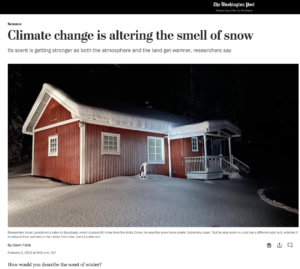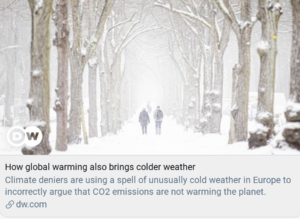Climate change is altering the smell of snow https://t.co/C86gt6JCxM
— The Washington Post (@washingtonpost) February 5, 2022
Climate change is altering the smell of snow
Its scent is getting stronger as both the atmosphere and the land get warmer, researchers say
By Dawn Fallik
Johan Lundstrom, a professor of clinical neuroscience who describes himself as a “smell researcher” at Monell Chemical Senses Center in Philadelphia, said because snow’s smell reflects the impurities in the air, the flakes in Wisconsin smell different from snow in Sweden, and from snow in a city. Lundstrom said that people notice smells more in the summer because the humid and warmer air intensifies odor molecules, in the same way perfume smells more intense and different on the skin than when it is sprayed in the air. But the cold and dry air of winter makes for a “poor odor environment.”
…
#
“In other words, significant biological differences between individuals means no two people perceive a smell as the same. Therefore, it is ludicrous to suggest that the claimed climate change affected snow over a long-term, or even short-term period can be reliably gauged by human olfactory response. The story appears to be little more than a headline-grabbing opinion piece designed to make you think that climate change affects nearly everything, but there’s absolutely no basis in fact for the claim.”





